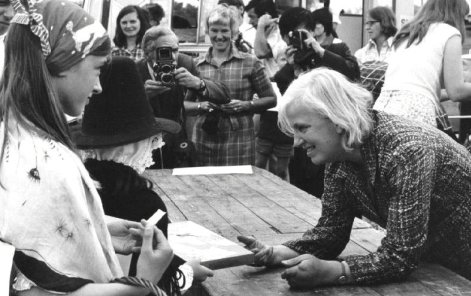 The Chancellor, Dorothy Hodgkin presenting
prizes to children at the Founders' Day fête in 1973
Photograph by the Arts Faculty Photographic Unit
The Chancellor, Dorothy Hodgkin presenting
prizes to children at the Founders' Day fête in 1973
Photograph by the Arts Faculty Photographic Unit In Bristol she is remembered as our longest-serving Chancellor after Winston Churchill. In 1970 Dorothy Hodgkin, despite her achievements, was a somewhat unusual choice, selected by a somewhat unusual method. At that time in Bristol there were University-wide discussions about what a University should be and what it stood for. The background was student protests and non-professorial corporate activism. There was a new Vice-Chancellor, who proposed a representative committee. (It was the student who first said, 'I think Dorothy Hodgkin would be a good idea.') All agreed that the Chancellor should be emblematic of the University to the world and that what was wanted was someone whose creative achievements could not be gainsaid. The committee then looked at the Order of Merit, of which Dorothy was the first woman member since Florence Nightingale. Gender was not an issue, though it was a bonus.
Churchill's robes were cut down, a lot of gold hit the dust and on the day of installation (20 May 1971) Dorothy's speech was delivered to a packed audience. What she said in her quiet voice resonated in the hearts of the wide academic community invited there. One Oxford dignitary remarked that if anyone had spoken to him he would have burst into tears. Frail as she was, there were good intentions to spare her too much effort. But she proved to be a hands-on Chancellor, attending many University meetings and functions, including Senate, Union Council, seminars in the Medical and Science Faculties, public lectures and lunching with student officers in the Union. She cannot always have been easy to accommodate because she had her own views on controversial internal issues, like the closure of the School of Architecture in 1981. But she had an innocent idealism, which surely must always find a home in universities. This led her to speak out, not only for black South Africa but also for Communist China. Above all, she stood for humanity, peace and a worldwide community of scholars, old and young. She was President of Pugwash and Lenin Peace Prize-winner. Her legacies in Bristol are Hodgkin House for overseas students and the Union's Hodgkin Scholarship for southern Africans, named in memory of her late husband, Thomas, a distinguished historian of Africa and an Arab scholar. Dorothy was a devoted wife and mother of three children, all of whom have been inspired to work overseas.
Visits to Bristol were packed with meetings with research students from home and overseas, friends and colleagues old and new. She took the teaching relationship very seriously; the cord was never broken. A former student of hers at Somerville, Margaret Thatcher, who visited Bristol as Secretary of State for Education and Science, clearly felt it, with affection. Amazingly there was time for everyone, to listen, encourage and advise. Dorothy was crippled by rheumatoid arthritis, which first struck in her twenties. At degree ceremonies she wore embroidered slippers. He painful twisted hands were drawn by Henry Moore; she ruefully commented that initially she had thought the picture was not very accurate, but that her hands grew more and more like the picture. She never complained; her spirit and determination triumphed, as one can see in the Harpley bronze bust on the Senate House stairs.
Despite her achievements and honours, she had no trace of vanity or intellectual arrogance. She was a remarkable woman, a giant of the academic world, an inspiring example and she was our Chancellor 'eminently worthy, honoris causa'
Obituary by Lady Maureen Merrison, University of Bristol Newsletter, October 1994.